#Pride and prejudice analysis
Explore tagged Tumblr posts
Text
You know how Caroline Bingley is anyways depicted as being very vain and selfish and pathetically territorial of Darcy?
I want an adaptation where we see that really she is trying to do what's best for her brother (not out of shallow judgment, but out of true social decorum).
Where she and Darcy are truly friends, where they once bonded over their shared snarkiness which was born of insecurity (due to the knowledge of their roles in their families) and of the hollowing exhaustion of the endless stream of people trying to get close to them for their money.
I want an adaptation where Caroline sees Darcy moving on, healing, growing, where Caroline is dealing with confusion and shame because Darcy is breaking the unspoken pacts they had to carefully never examine their own shortcomings, where Caroline is lashing out and needy and she sees it and she hates it but she can't stop herself because he's leaving her alone after they had found each other.
I want to see Lizzy from Caroline's eyes - somebody who clearly thinks herself clever and better than everyone, someone who disdains Darcy, someone who is charmed by Wickham (who hurt Darcy so badly that Darcy won't even share what happened with Caroline), someone who doesn't hide the fact that she thinks Caroline is stuffy and clingy, someone who doesn't ever stop to wonder what it would have been like to be raised in a household that did not care for your thoughts or your opinions and only expected you to be stylish and to marry well and to preserve the family reputation at all costs.
I want a sequel not about Lizzy and Darcy's sex lives, but of Jane's kindness and Lizzy's authenticity and Charlotte's practicality helping Caroline find herself.
I want a sequel of Caroline confronting Darcy about his disdain and mansplaining. I want a sequel where Lizzy finds some humility, where Caroline finds some courage.
I pretty much want all female rivalries in stories to be rewritten.
I just have so much sympathy for Caroline. Like probably she can see what she's doing, how her desperate attempts to draw Darcy's attention are actually driving him away, but she can't stop herself. How she is so afraid of being abandoned, of being judged, that she judges people before they can do the same to her.
#pride and prejudice#caroline bingley#darcy#lizzy bennet#jane austen#kiera knightley#matthew macfadyen#fitzwilliam darcy#elizabeth bennet#pride and prejudice 2009#pride and prejudice 1995#bechdel test#female rivalry#feminism#feminist#literary analysis
63 notes
·
View notes
Note
Per the notes of your last post, I’d love to hear more of your Thoughts™️ about why Pride & Prejudice works because the two main characters are neurodivergent!! I’ve thought a lot about Darcy being neurodivergent, but not so much Lizzie…
Oh my dear friend you have no idea what you’ve gotten into
So most of the characters in Pride and Prejudice are pretty much stock caricatures, right? Mrs. Bennet is the archetype of the meddling, embarrassing mother, Mr. Wickham embodies the idea of a wicked, seductive rogue, Caroline Bingley is the trope of the bitchy romantic rival. Even Jane (while arguably quite complex) is a classic kind-and-forgiving ingenue, or at least extremely similar to one.
The only exceptions to this rule are Elizabeth and Darcy.
Let’s start out with Elizabeth. You can clearly see she’s a complicated character right out the gate. She’s witty and intelligent but not very wise about people, she’s extroverted and kind to her sisters but can also be rude to people who don’t necessarily deserve it, she doesn’t take many things seriously other than her own opinions. She idolizes her father and ignores his many, many flaws because they’re also HER flaws- they share a bemused high-and-mightiness about their intelligence.
Elizabeth is the protagonist, so readers might expect her to be more complex than side characters. But there’s also something so isolating about being the only fully-fleshed person in a house or a ballroom full of stereotypes and caricatures. So sometimes Elizabeth lets her true colors show, but other times, she plays the game to be able to do the same things her sisters do easily (although she can’t help letting her personality shine through, like at Rosings).
In contrast, there’s Darcy, who doesn’t appear particularly complex at the beginning of the novel. At the ball, he’s proud and unsociable, and he appears not to think much of Elizabeth: “she is tolerable, but not handsome enough to tempt me.” He’s a stereotype here, like all the other characters- specifically, the stereotype of the proud and haughty rich man with little regard for others.
But over the course of the book, Darcy changes dramatically, and so does Elizabeth’s (and the reader’s) perception of him. He’s still proud and he’s still rich, but those aren’t his only qualities. He’s a generous master and a loving brother, he’s an introvert who freezes in public but flourishes around those he cares about, he’s a devoted friend who doesn’t ask repayment for the most extravagant favors.
And, crucially, they share these complexities with each other. Darcy is at his haughtiest and his humblest when he’s with Elizabeth, and Elizabeth laughs and rages at Darcy in turn. They share with each other their flaws at the end, and they realize they’ve found kindred spirits in each other. It’s worth noting that, apart from in her own thoughts, the only person who refers to Elizabeth by her full name is Darcy. Their minds work in very different ways, but they’re both even more different from those around them.
Elizabeth and Darcy are drawn to each other in a way that only two “different” people can be. In a world where their defining qualities are ignored and ridiculed, they each celebrate and love what makes the other who they are. That’s neurodivergent love in its most beautiful form.
I was also gonna talk about Wickham and Georgiana, but this is long already so I might make that a separate post! @dearausten and @koheletgirl I think you might also like this :)
#soph’s askbox#pride and prejudice#Maya tag#Sorry this is late I’ve been incredibly busy#But today was my last day of school not counting exams#So I’m just chilling#Pride and prejudice analysis#Elizabeth x darcy#Also this post is for Shira btw#In conclusion Elizabeth and Darcy are nd4nd and I love them goodnight <3
41 notes
·
View notes
Text
Stuff like this just makes me like Jane Austen more and consider how well-developed her characters are and how much she explores.
We have all the facts, but the characters don't, and in this age they can't just message someone to talk about it.
Mr. Bingley and Jane were hardly being in the wrong, they behaved well by the standards of the society, but that leads to the problems.
Today I understood why Mr Bingley is important for 'Pride and Prejudice.' Of course I've heard that he's Mr Darcy's foil and he helps us see that Mr Darcy lacks manners. And probably we need him to see a man whose character trait is quickly deciding to leave a place and who might never come back, and who also - I don't know - can easily get under the influence of his friends.
And I have always seen him as a very insignificant side character, and I never understood why there was even a need for him; like why Jane Austen of all people would write such a lacking(?) side character. He is not really a commentary on something. He's just fickle.
And was there even a need for Mr Bingley & Jane's love story? They're basically 'love at first sight, destined for each other' and they look quite out of place among the other three couples -- Elizabeth and Mr Darcy, Lydia and Mr Wickham, Charlotte and Mr Collins -- that are all a commentary on love and society.
Today I understood that had there been no Mr Bingley Jane would've married Mr Collins out of obligation as the eldest sister and that would have been a very different book that didn't feel like such a happy story by the end of it (my Mom calls it a fairy tale), had only one of the sisters (Elizabeth) landed herself a love match.
Maybe I'm wrong, maybe there is an undercurrent to Jane's story that is about her being an angel and that their love with Mr Bingley is a dream that rarely comes true, I don't know. But still, apparently Mr Bingley is not as inconsequential a character as he has always seemed to be.
#jane austen#pride and prejudice#jane austen analysis#pride and prejudice analysis#mr bingley#jane bennet
3K notes
·
View notes
Text
Two statements about characters can and should co-exist: Pride and Prejudice edition
Mr Bennet has a close relationship with Elizabeth and provides amusing observations on the folly of human nature BUT he is a terrible husband and father who consistently neglects the women who rely on him for absolutely everything; Elizabeth and Jane turned out so well in spite of him, not because of him.
Mrs Bennet's behaviour is understandable given the era in which she lived and the subsequent pressure she was under to get her daughters married well, which wasn't entirely for vanity reasons given that Longbourn was entailed BUT she was still fundamentally vain, ridiculous and rude; such pressure, even combined with an absent husband, still does not make her behaviour justifiable, nor her a sympathetic character, as she enabled Lydia (whose subsequent elopement with Wickham almost ruined the family) for far too long.
Mr Collins is unfairly portrayed as a middle-aged sycophant in most adaptations, rather than the young clergyman who sucks up to his patroness in pursuit of a more lucrative living that he was BUT he is still a ridiculous character who you are not meant to feel sympathy for when Elizabeth rejects him; he is rude, hypocritical and thinks of himself far too highly considering how vapid he actually is.
Caroline Bingley is often too harshly judged as a 'pick-me,' even though her relentless pursuit of Darcy is understandable given his wealth & status and how important it was for women to make a good marriage BUT she was still rude, vain and treated Jane terribly; plus she was a hypocritical snob, given the manner in which she looked down upon the Bennet family's relations despite the Bingleys' own background in trade.
Elizabeth is incredibly witty, courageous and endearing and instantly likeable which makes Darcy's slight of her at the Meryton assembly all the more of an affront to us as readers BUT, while it explains her dislike of him, she is no means perfect herself; she had far too much misplaced pride in her ability to successfully read others' characters and consequently ignored positive accounts of Darcy in favour of believing the deceitful Wickham, given her prejudice against the former.
Mr Darcy was harshly judged by Elizabeth, even though there are many more sympathetic elements to his character than immediately meet the eye BUT he was not shy or innocent; he was always a haughty rich man who had never been told no, thought far too highly of himself and, ultimately, thoroughly deserved to be rebuked and subsequently made to reform his character.
#pride and prejudice#jane austen#mr bennet#mrs bennet#mr collins#caroline bingley#elizabeth bennet#mr darcy#fitzwilliam darcy#classic lit#text#my analysis#all these characters have so much nuance to them#it's why i adore the book and care so passionately about them NOT being flattened#like all humans they are flawed and jane austen very much meant for us to know that!!!!#i was trying very hard to say something nice about mr bennet#great gowns beautiful gowns#i truuuuly loathe him but don't confuse hating mr bennet for redeeming mrs bennet#elizabeth can't even fault darcy on that like his approach was wrong but. he had a POINT#anyway thanks for coming to my ted talk this is very important to meeeeee#1k
2K notes
·
View notes
Text
Sometimes Darcy gets accused of not actually being in love with Elizabeth at the time of his first proposal, that he just proposed out of lust, and like yeah lust was definitely a part of it, but I believe him that he truly loved Elizabeth.
Marriage was a big deal. He'd never really be able to divorce her. This was gonna be it for life—and while Elizabeth for life might be wonderful, he's also getting the Bennets for life.
I don't know how much he knew about the Bennets' financial situation beyond the entail, but he had to have known there was a strong chance Mrs. Bennet would end up living with him after Mr. Bennet died. He could afford to set her up in her own house, but they'd still have to spend a lot of time together. And it wasn't just Mrs. Bennet—he'd be saddling himself with the lifelong care of potentially multiple of Elizabeth’s relatives, which is bad enough when you actually like the people, but these are people who he can't stand, and rightfully so! I'd despise living with any of them except Elizabeth and Jane, and maybe Kitty. He's not being a snob when he criticizes them—they legitimately suck. (Well, he is being a snob and dumbass by saying it out loud, but Elizabeth herself knows the criticism is justified.)
On top of all that, he knows marrying Elizabeth is gonna piss off his own family, and potentially jeopardize his friendship with his bestie Charles.
And you're telling me that Darcy was willing to take on all of that shit just for sex?? Sex is easy to get. Hell, even sex with a pretty, kind, smart wife would be easy for Darcy to get. Elizabeth is not his only good option.
I know people's genitals make them do all sorts of wildly stupid things, but I don't think even Darcy's penis is powerful enough (and I've read fanfic, I know how powerful Darcy's penis is) to make him propose to Elizabeth Bennet if he didn't truly love her.
#yeah i'm sure he grows to love her even more deeply by the second proposal#but i'm certain there's real love there at the first proposal#he's dumb but not unintelligent and reckless#pride and prejudice#jane austen#mr darcy#elizabeth bennet#the bennets#literary analysis
744 notes
·
View notes
Text
Pride and Prejudice Summary Is an 1813 novel of manners by Jane Austen, The novel follows the character development of Elizabeth Bennet, the dynamic protagonist of the book who learns about the repercussions of hasty judgments and comes to appreciate the difference between superficial goodness and actual goodness.
#pride and prejudice summary#pride and prejudice book summary#pride and prejudice plot#pride and prejudice analysis#pride and prejudice synopsis#pride and prejudice chapter summaries#pride and prejudice short summary#pride and prejudice plot summary
0 notes
Text
Writing Compelling Side Characters
**NOTE: Some of these tips don't really apply to ensemble casts, where there are multiple Main Characters (plural).
1) Agency - motivations, actions, effects
Technically, they ARE side characters in your MC's story, but don't base your writing on that fact.
Side characters need:
Their own REASONS for joining the story (because they want to, not because the PLOT wanted them to) Example: In Arcane, Caitlyn inadvertently gets involved with Vi due to her compassion and desire to help the undercity, not because the plot needs a love interest
A GOAL, on which they act INDEPENDENT of the plot, and actually affects your MC/the main plot (not the other way around) Example: In Loki, Sylvie's independent goal is to take down the TVA, and her actions reveal the TVA's corruption to Loki, influencing him to join her in fighting against the TVA instead of working for them
A STAKE in how things end (e.g. someone getting paid after agreeing to join a heist); they aren't just in it to be a "comic relief" or a "damsel in distress" Example: In Breaking Bad, Jesse joins Walt in cooking meth because he makes BANK from selling drugs, not because Walt needed a funny and traumatized sidekick
Their own RELATIONSHIPS with other characters, aside from the MC—they have their own friends, enemies, love interests, etc., and these relationships can completely change the plot Example: In the original Percy Jackson series, all of the side characters (e.g. Annabeth, Nico, Thalia, Luke, etc.) have their own relationships with each other that greatly affect the plot. Check it out: Annabeth's attachment to Luke, even after he became evil, completely changed the plot in several ways: kickstarting a journey to save her from Luke in The Titan's Curse, revealing his true evil identity as a vessel for Kronos (big bad!) in The Battle of the Labyrinth, and mainly contributing towards Luke's reversion away from evil in the last book due to him remembering his promise to take care of her a long time ago, etc.
Their own PAST that affects how they act, move forward, and how they treat the MC Example: In Avatar: The Last Airbender, Azula's pressure on herself and desire for perfection is greatly driven by her father's expectations of her as the fire-bending prodigy, resulting in a childhood of earning parental love and care AFTER she proves her worth to him. This created a mentality ceaselessly focused on her goals—which are usually her father's missions—causing her to be deadly, manipulative, and constantly causing problems for the main character.
The side character is not an extension or byproduct of the MC's plot; their own story happens to collide and intertwine with your MC's plot, but is ultimately independently driven.
2) Affecting the ending
The story can't have reached the same ending regardless of the side characters' existence. They must be necessary to the MC in helping them reach their goal faster, more prepared, etc. For example, in Avatar, Aang would not have been able to reach his goal of defeating the fire lord without the help of his friends, who each taught him valuable life lessons as well as combat skills.
Each character must have an independent impact on the MC—don't treat them like a group (e.g. "the side characters," who are one individual collective). Arcane does a great job with this, as each side character has a completely different impact on the MCs (e.g. Silco, Ekko, Caitlyn, and Vi—not a side character but for the purpose of this analysis, bear with me—all have a different impact on Jinx). It isn't just a literal impact. It's what the MC learns, and the theme of the story. They should help the MC realize things about themselves, and contextualize the MC by showing them in different situations with different people.
3) Avoid stereotypes Don't create characters from moulds and conform 100% to the trope: e.g. the "comic relief" can also be "the outlaw/rebel" or the "love interest," the "brooding antihero" can also be the "caregiver" or the "wise one," the "seductive girl" can also be the "science nerd" or the "broken optimist," etc. Mix and match. Everyone has more than 1 personality trait in real life, and probably fulfils more than 1 role to the other people in their lives. Give them intersecting personality traits to flesh them out.
4) Theme and Arc Especially compelling side characters have their own arc and embody their own theme.
Example 1: Mr. Darcy in Pride and Prejudice is more than the brooding love interest—he develops by being less arrogant and learning to see people beyond their social status, and opens up to new ideas, people, and situations.
Example 2: Nico di Angelo from the Percy Jackson series goes on a journey of self-acceptance and embracing his identity, instead of just being the stereotypical emo kid who is constantly in a state of angst.
Example 3: In Arcane, Silco goes from a ruthless crime lord who believes that attachment is weakness, to someone who genuinely cares about his adoptive daughter, so much so that he can't give her up even in exchange for his lifelong dream.
∘₊✧────── ☾☼☽ ──────✧₊∘
instagram: @ grace_should_write
Hope this was helpful, and let me know if you have any questions by commenting, re-blogging, or DMing me on IG. Any and all engagement is appreciated :)
Happy writing, and have a great day!
- grace <3
#writers on tumblr#writing#booktok#writeblr#novel#writer#writerslife#wattpad#writing tips#writergram#wip#media analysis#book recommendations#bookstagram#plot holes#writing ideas#ya fantasy#fantasy#ya fiction#characters#villains#writing villains#anti heroes#arcane#atla#percy jackson#breaking bad#pride and prejudice#loki laufeyson#loki
212 notes
·
View notes
Text
Fitzwilliam Darcy's Lucky Waistcoat, A Comprehensive Analysis
So I was re-watching the BBC Pride and Prejudice, as you do, and I made a joke that Darcy was having his valet get his lucky waistcoat to go see Lizzy- and then I was like, wait. Isn't he wearing that same one the day she comes to Netherfield to take care of Jane? Maybe it IS his lucky waistcoat!
So I had to re-watch it again to validate my theory and honestly I think I might be on to something.
First, the waistcoat in question: it looks brown in some lights and olive green in others, but I'm fairly sure it's the same garment. It has vertical stripes, a narrow double gold stripe alternated with a stripe of a woven-in diamond pattern. (Interestingly, Elizabeth's eyes look brown in many lights but when you see her in sunlight it becomes obvious that her eyes are a dark hazel. Am I saying the costume designer chose this fabric to match Elizabeth's eyes? No, but I'm also not NOT saying that...)
It appears the first time in the scene where Darcy runs into Elizabeth outside of Netherfield when she has walked across the fields to check on Jane - the scene where the stage directions for Darcy notoriously said that he had an erection - and also in the next scene at breakfast, which happens immediately afterward, and when he goes shooting with Bingley and Hurst.
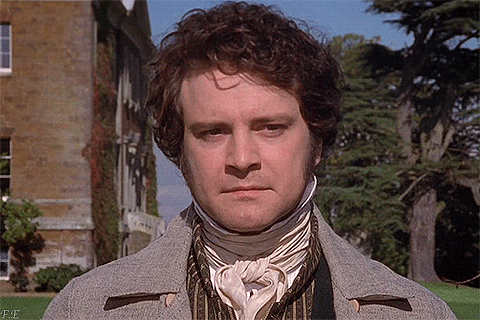
(By the way the way he says "not at all, they were brightened by the exercise" and then sips his tea while maintaining dead on eye contact with Caroline like a cat pulling your drink off the side of a table is just... *chef's kiss* .... perfection.)

The next time we see it is the day that the Bennet sisters leave Netherfield. Caroline is wearing a very distinct outfit in this scene that has black, gold, and red stripes - note this for later.

At this point, my theory is that this is just one of the waistcoats Darcy brought to Hertfordshire, so it's in his rotation.
Interestingly, the next time we see it is during the scene where Jane is reading Caroline's letter and Elizabeth is imagining the scene of Bingley meeting Georgiana. I've reblogged a post before that notes that in this scene Georgiana is wearing a very fussy pink dress, styled more like the way the Bingley sisters dress and very unlike the things we see Real Georgiana wearing later on. But Caroline is wearing the very distinct stripey outfit and Darcy has on the gold striped waistcoat - it seems the Elizabeth is imagining them in the outfits they were wearing the last morning at Netherfield - possibly the last time she saw them in less formal/day clothes.

The next time we see this waistcoat is at Hunsford: Darcy wears it with his bottle green coat on the day he calls at the parsonage and sees Lizzy alone and they have the super awkward conversation about how far away is too far to live from your family. He comes alone this time, not with Colonel Fitzwilliam, and this is where I feel like the "lucky waistcoat" may come into play - it's the one he was wearing the first time he looked and her and had his "...oh" moment. It's kind of the color of her beautiful eyes. He's going to try and talk to her without his cousin there... it feels like Date Outfit vibes to me. ( I mean that scene is SO awkward because: Darcy, but still.)

He does not, however, wear it to propose - he's dressed for dinner, I think, and has a pale brocade waistcoat on during that scene.
Anyway we don't see the Lucky Waistcoat again until we get to Pemberley, and it features really heavily in several key scenes there.
First off, after Darcy jumps in the pond and runs into Elizabeth in his backyard, he rushes inside to get dressed and comes out, still buttoning his coat, his hair damp, wearing HIS LUCKY WAISTCOAT:
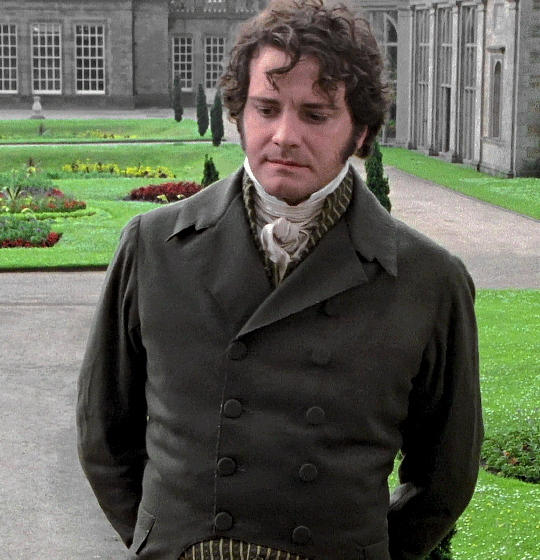
And then the next day when he brings Georgiana to meet Elizabeth he's wearing it AGAIN:
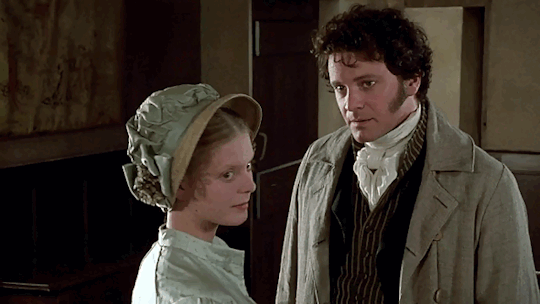
And then after the dinner where Elizabeth and Georgiana make friends and Darcy sits in the music room watching them with his whole entire damn heart in his eyes like he has never been happier in his life, the next day we see him getting dressed and primping and asking his valet to give him his green coat which is paired once again with the Lucky Waistcoat because apparently it's working for him so far? She doesn't hate him anymore and she and Georgiana are making FRIENDS and Elizabeth SMILED at him and everything's coming up Darcy.

So he goes to Lambton to see Lizzy at the inn again - side note, I am SO CURIOUS what he was planning on talking to her about, especially since apparently she was already confirmed to go to Pemberley again later that day - but OH NOES Lizzy has just gotten the letter about Lydia:
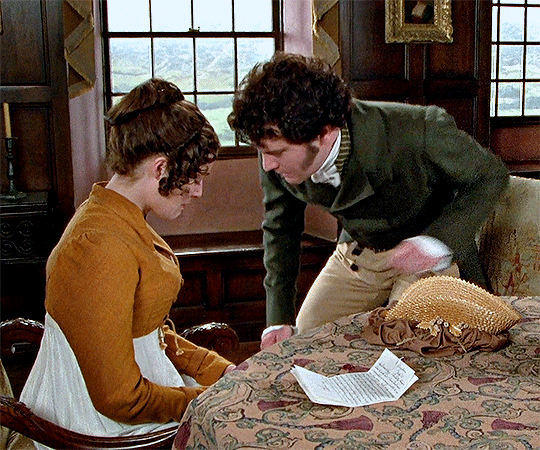
(the way he holds her hand and then realizes he doesn't have the right to and SO RELUCTANTLY moves back)
The next time we see it is in the short scene where he is looking for Lydia and Wickham and stops at what looks to be a coaching inn to ask after them. At first I took this as a sign that he left straight from the inn to look for them but it can't be, because there's a short scene at Pemberley where he is with the Bingleys fretting about it and storms off which I think is the dinner that Elizabeth and the Gardiners had to miss. So maybe he wore it because it made him feel close to Elizabeth, or because he was hoping for luck in his search? I couldn't find a screenshot of this scene but trust me. :) (He's wearing a different waistcoat in the scene where he confronts Mrs. Younge in London and another one still in the flashback where he's talking to the Gardiners, so obviously it took him a while to track them down.)
The final Lucky Waistcoat appearance is during the scene where he apologizes to Bingley for interfering, gives him his blessing to propose to Jane, and leaves to go back to London. I couldn't find a gif but here it is with a (perfect) Onion headline:
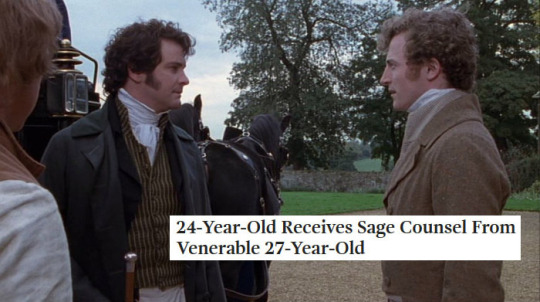
I think it's interesting that this is the last time we see it, because this is actually when he is LEAVING - when he thinks that he doesn't have a chance with her anymore but at least he's done his best to fix what he broke by bringing Bingley back to Jane and bribing Wickham to marry Lydia. It's so important to his character arc that he does this! He changes his behavior and does his best to fix what he did wrong, because of Elizabeth - because he listened to her criticism and realized she was right about him - but not in order to get another chance with her. He does it because his own sense of morality demands that when he knows he's done wrong, he should do his very best to make it right again. My theory for why he wears the Lucky Waistcoat - or perhaps it would be better called the Lizzy Waistcoat - in this scene is that when he sends Bingley off to propose and leaves town, it's kind of the bittersweet endpoint for him of this relationship that has made him a better man. I think in this scene he is thankful that he met Elizabeth, and while he will never forget her he feels that he can at least go forward knowing that he did his best to make it up to her. I think he probably feels that the second chance he was hoping for at Pemberley being derailed by Wickham and Lydia's elopement - which we see he blames himself for since he didn't do anything to warn Meryton about Wickham's true character - is a fair punishment. It hurts but he's done what he can and at least he's managed to save the Bennet's reputation, and Elizabeth will be so happy for Jane to be happy with Bingley. I picture him staring wistfully out the window of his carriage all the way to London, giving himself one last day to just wallow in his might-have-beens before he has to steel himself to live without Elizabeth. Maybe he's telling himself that they can meet at Bingley's wedding as common and indifferent acquaintances.
And then Lady Catherine comes to see him and is super indignant that Elizabeth refused to promise her never to get engaged to him and he books it back to Longbourn because he cannot live in suspense. He has to know if he has a chance at happiness after all.
He doesn't wear the Lizzy Waistcoat when he makes his second, successful proposal; it's a pale brocade one, visually similar to the one from the Hunsford proposal though I haven't verified whether it's the same one or not. But then, he doesn't need the Lizzy Waistcoat anymore, because in all the rest of the scenes he has LIZZY.
Anyway that's me probably thinking way too hard about a single clothing item from the 1995 BBC Pride and Prejudice, thanks for indulging me. (Seriously though the costumes in that are so good. I am also obsessed with Maria Lucas' adorable green coat with the pink lining and pink bow fasteners and the rosebud-adorned pink and green dress Harriet Forster wears in her first scene, I think it's at Lucas Lodge?)
142 notes
·
View notes
Text
Both Pride & Prejudice and Much Ado About Nothing work so well as enemies to lovers because despite surface animosity, it's clear that both end couples really respect each other and for good reasons. I think you could even argue that with Beatrice, she spars with Benedick because she considers him a worthy opponent.
When Hero and Ursuala plot to make Beatrice fall in love, Hero instructs her to speak of Benedick and "praise him more than ever man did merit" and yet when Beatrice finally speaks, she doesn't disagree with their high praise, she says of Benedick:
For others say thou dost deserve, and I Believe it better than reportingly.
Benedick likewise after his eavesdropping on Don Pedro, Leonato, and Claudio's praise Beatrice says:
They say the lady is fair; 'tis a truth, I can bear them witness; and virtuous; 'tis so, I cannot reprove it; and wise, but for loving me; by my troth, it is no addition to her wit, nor no great argument of her folly, for I will be horribly in love with her.
Similarly in Pride & Prejudice, once the misunderstanding about Wickham is cleared away, Elizabeth is able to acknowledge to herself how much she respects and likes Darcy:
She began now to comprehend that he was exactly the man who, in disposition and talents, would most suit her. His understanding and temper, though unlike her own, would have answered all her wishes. It was an union that must have been to the advantage of both: by her ease and liveliness, his mind might have been softened, his manners improved; and from his judgment, information, and knowledge of the world, she must have received benefit of greater importance.
Darcy also finds that he admires Elizabeth, after initially dismissing her:
But no sooner had he made it clear to himself and his friends that she had hardly a good feature in her face, than he began to find it was rendered uncommonly intelligent by the beautiful expression of her dark eyes. To this discovery succeeded some others equally mortifying. Though he had detected with a critical eye more than one failure of perfect symmetry in her form, he was forced to acknowledge her figure to be light and pleasing; and in spite of his asserting that her manners were not those of the fashionable world, he was caught by their easy playfulness.
All of these characters also hear and accept criticism of themselves. Both Benedick and Beatrice hear they are too proud to accept love, which they both overcome. Elizabeth learns that she judged Darcy without sufficient information and Darcy that his behaviour was not that of a gentleman. Their mutual acceptance of this criticism and their growth as people leads to their ultimate happiness.
Unfortunately, those who reproduce this trope often forget to build this foundation of respect and the acknowledgement, either personally or publically, that the characters have been wrong. Instead we get characters who mid argument begin ripping each other's clothes off. No growth, no understanding how they have been wrong, it just becomes "thin line between hatred and love" instead of "we grew towards each other".
#enemies to lovers done right#enemies to lovers trope#trope analysis#pride and prejudice#much ado about nothing#much ado about nothing day#growing towards each other#obviously the character growth is almost instant in Much Ado#but that's just a time factor#a lot more room in a novel#shakespeare#benedick#beatrice#elizabeth bennet#mr. darcy#fitzwilliam darcy
1K notes
·
View notes
Text
While I absolutely love the 1995 Pride and Prejudice adaptation, the 2005 version has some of my favorite filmmaking and cinematography.

The dance scenes are energetic, the camera constantly moving, following and showing out main characters but also makes the audience feel like they are there as well. The closeness of the camera, the large amount of people in an enclosed space really sets the atmosphere.
And in contrast, whenever the rich are shown on screen (Lady Catherine de Bourg's place) the people and camera are still, the blocking like that of a painting.

The way the sisters are shot makes them really feel like family. They are constantly close to each other, literally in each other's business.


The look these two give each other when they are finally on the same page and getting engaged. Shy, excited, in love.

The change in camera angles on Darcy as Lizzie and Darcy become closer. First the camera tilts up slightly when they are juxtaposed, but then at a straight angle when they are more equal in their feelings.


Tracking shots! So many beautiful tracking shots.

Mr. Darcy making it up to Bingley by acting as Jane while Bingley nervously practices proposing.

And of course the hands! Nothing more romantic than this.

The closeness to the book is great in the 1995 adaptation and I would be remiss not to include this gif in any post about Pride and Prejudice.
#pride and prejudice#mr darcy#elizabeth bennet#pride and predjudice 2005#pride and prejudice 1995#keira knightley#matthew macfadyen#meta analysis
86 notes
·
View notes
Text
"Well then, your hands are cold."
After the obligatory annual rewatch of Pride and Prejudice my father asked me: "Why does Lizzy tell Mr Darcy that his hands are cold after he confesses his love to her again?"

And I didn't know how to answer that - UNTIL. I. REALISED.
WILD GUESS, but if I recall correctly from my limited experience of 21 years on planet earth, your hands get cold when you are anxious about something or nervous or what not (excluding the cases of external temperature change or sickness, we are talking pure emotions here).
Now watch this:

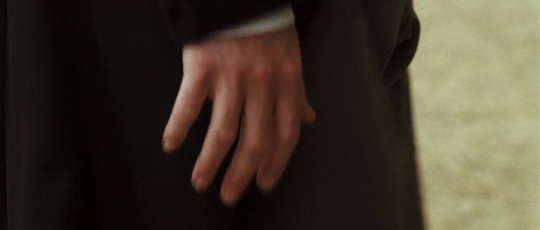
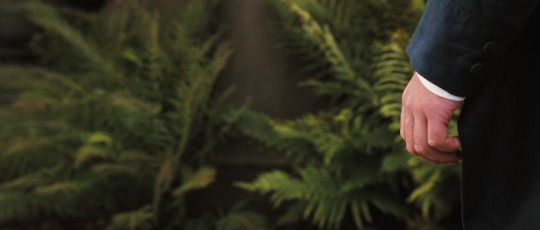
Throughout the movie there are 3 deliberate closeups on Darcy's hands before the climax, all of which occur in immediate proximity to Lizzy. And I cannot help but notice, without wanting connect one with the other right on the nose...

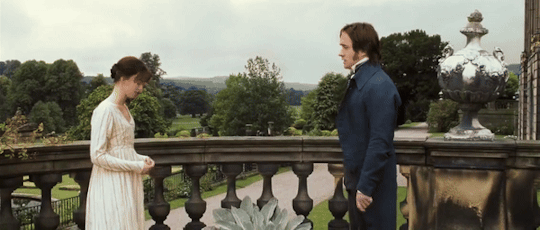

...look at his hands! He is SO. NERVOUS. around her it makes me wanna scream and giggle and cry-
Now, I hope it is not too bold of me to assume, but...
...I mean you clearly see where this is going...
When he helped her onto the carriage...
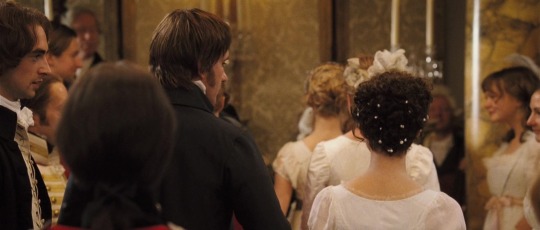
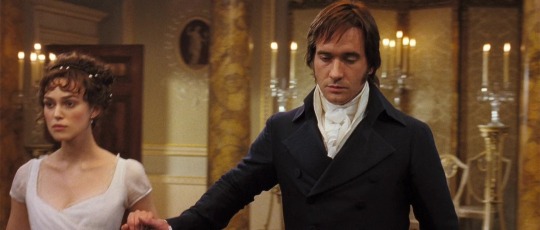
...when they were dancing, when they finally meet on the field at dawn.
You put everything together and you've got your answer.
So, what's my theory? Darcy's hands have been cold all this time when we see him around Lizzy. And Lizzy has been paying attention.
That's it. That's the juice.
You may go on with your normal life now while as you still can.
Pls tell me someone else figured this out before me and I am just late to the party.
#he's such a nervous bean and i love it#this movie#istg#pride and prejudice#analysis#film analysis#i've been analysing the Netherfield ball sequence for a visual storytelling class in uni#and my god#there is SO MUCH IN THERE#if this is not my number 1 comfort movie idk what is#it's 3 am what am i doing here#mr darcy#elizabeth bennet#elizabeth x darcy#fitzwilliam darcy
59 notes
·
View notes
Text
deadpool 3 is literally......pride and prejudice ...hear me out...
having mr darcy acting in the deadpool movie has to be a SIGN like ... everyone's playing their most famous character and then he's just paradox. nothing is as it seems~ ooo~
anyway~
i think logan is totally mr darcy and wade is elizabeth.
logan is a well off man with a rich history, everybody loves him. and wade is jealous of that, he doesn't see himself as highly regarded as logan and perhaps is not. and wade, well he's the brown eyed beauty.
"are you into dancing" "not if i can help it" / save my world or i'll make you take a breath through your forehead (and then he drinks and passes out, just not to dance with wade. [and dancing is used as a parallel already by the canon use of 'lady in red' in the film]).
mr darcy is totally closed off and nasty, he insults her appearance, he doesn't wish to participate in anything. but immediately after hearing her out, he's doing whatever she says to do to change himself.
logan was kind of enchanted from the first moment they met, i think. but he was still RUDE after.
and wade sees the way logan acts, at face value and is like that guy sucks, then paradox is like, this guy sucks even more than you think. and wade is like omfg that's terrible (just like in P&P).
wade misunderstands logan's rudeness, and other peoples rudeness as well. and thinks he's a bad person because of it. he looks at paradox who he speaks so well and is so polite and tells wade 'logan is a horrible person (JUST LIKE THEY SPOKE BADLY ABOUT MR DARCY). you're gonna be an avenger'. and wade believes him. and then once that is revealed to be a not true, only she and her father know that in the end, just like only wade's family knew about how they saved the world.
wade thinks people babying him and letting him do whatever he wants is love, but logan is the opposite of that so he feels very attacked.
but logan judges too quickly as well as wade. and even with his JUDGEMENTS of wade, he was mesmerized by wade (most hot men and vanessa are in the movies ,it's no big deal, tch)
he was too proud to accept the x men, too proud to admit he wants to fit in. and too proud to say he wants to be with wade. he thinks hes above it all.
Wade tells Logan to practice speaking aka to speak with cassandra . and logan rejects to dance with the lady (join him on the mission).
and in both movies, the hand holding really shook something in their worlds. elizabeth/wade saw something there. PLUS logans glove literally exploded off his hands that moment so its like he touched this lowly girl, like it was no big deal. Like, that's just what you're supposed to do. And wade hasn't met a hero like this that would sacrifice himself for wade so he's really in awe.
OKAY. HER, WADES VIEW OF MR DARCY started to change, there was something different there. HE TOUCHED HIM!!
and then it took wade accepting logan and telling his mom about him and all he did for her. bwaaaaaa n the movie ends.
has logan been in love with wade since day 1 ? did he really believe wade's lie or did he want to be with someone/wade. he's a little puppy needing a home. he won't dance if he can help it, but if it's for wade, he does. he kinda believed it, but also he wanted to take his rage out on something.
it was a good excuse to go along with deadpool, otherwise he'd be forced to say he simply wants to be with deadpool and he's absolutely not that type of person. he has to belittle wade/Elisabeth to make himself feel bigger. later on he realizes how badly he treated her.
wade heard logan's words of understanding, then he felt logan touch him for the first time. and then they touched knees and shoulders~ teehee~ and not touching on accident due to bad circumstances, or because they're tied together or in an act of brutality, but just casually out of love~ meep~
the world tried to tied them together....by force, out of necessity and THAT IS comparable to marriage, but they don't JUST need each-other in the end, they want each-other. and wade proposes to logan for logan to stay. even though they could have parted ways.
but wade has bewitched him body and soul entirely. 'my affections havent changed ,but one word from you will silence me forever(logan wanting to walk out, he didn't wish to make wade uncomfortable with his desires). i never wish to be parted from you since this day on.' thats the third act when logan realizes wow wade is incredible.
but also wade literally needed him, just like elizabeth needed a husband to marry, but she didnt want it to be mr darcy. but oh how wrong she was!!! if it was 1813 and wade was the lowly girl who needed a husband to survive, she really wants it to be mr logan darcy. basically.
and wade kinda does need to depend on someone, sure not societally the way she HAD to, she had no other options, but wade depends on people in every single other way, economically ,mentally and emotionally he does depend on others. and he hates that vanessa isn't his like bride to be.
but he sort of wanted to be her equal and her not take care of him at the same time. which is like a battle in his mind, they aren't on the same level. but logan and wade took care of one another on equal grounds.
you must know surely you must know it was all for you (wade says that basically to vanessa) GULP does logan feel the same way to wade ruh roh.
EEEEE
#poolverine#deadpool 3#i did watch pride and prejudice bc of this movie....LOL#its great#guys and im correct#text#movie analysis#movie#film#film analysis
26 notes
·
View notes
Text
Adaptations of novels by their very nature are always going to differ from the source material but I find it interesting precisely how they do.
For instance, I find it curious that both the 1995 and 2005 adaptations of Pride and Prejudice feature scenes where Elizabeth declares she will only marry for love, because not only is such a quote nowhere to be found in the novel, I also find such a sentiment unrealistic for a Regency lady.
As stated in Chapter 22,
'[Marriage] was the only provision for well-educated young women of small fortune, and however uncertain of giving happiness, must be their pleasantest preservative from want.'
All women knew they would be expected to find a husband to provide for them, given that they weren't... you know... classed as people in their own right by law. Especially the Bennets, who lack substantial dowries and know as soon as Mr Bennet dies, any unmarried sisters will be entirely dependent on their male relatives, which isn't a secure position.
Of course, it wouldn't be unheard of for a woman to wish for a husband she could respect and who respected her in turn. But she's not an idiot! I think Elizabeth is astute enough to realise that a love match would be a bonus rather than an expectation for her marriage. She doesn't quite sink to the depths of pessimism of Charlotte in asking only for a comfortable home, and I think Elizabeth would still expect a partner to respect her (hence why she refuses Mr Collins and Mr Darcy at his first time of asking) but I don't see her as a hopeless romantic. Not Elizabeth, who voiced her increasing dissatisfaction with the world and the people who inhabit it.
I wonder if these adaptations included such a line because they find the idea that in Mr Darcy, Elizabeth found the true love that she was never expecting to find to be the most romantic idea of all. Personally, I think that not expecting to marry for true love but finding it anyway, especially in the man she least expected, is far more romantic.
These scenes have long frustrated me because I think they fundamentally underestimate the pragmatism of women at the time and make Elizabeth and Mr Darcy's union a little less satisfying! She loved him in the end, yes, but even if they failed to overcome their respective shortcomings and somehow failed to end up together, I hardly think that Elizabeth would have turned into an old maid, sitting at Longbourn and desperately waiting for a true love that would never come...
#pride and prejudice#mr darcy#jane austen#elizabeth bennet#fitzwilliam darcy#pride and prejudice 1995#pride and prejudice 2005#my analysis#darcy meanwhile? oh he would've been pining at pemberley#very curious though that BOTH have scenes like this because where did that come from????
707 notes
·
View notes
Text
What do we think happened when Mr. and Mrs. Collins showed up at Lady Catherine's house to drink tea and explained that Elizabeth stayed at home alone with a headache?
Did Darcy excuse himself immediately? That would have looked super suspicious, at least to Charlotte. Not that I think he would have cared if anyone guessed what he was going to do, because he was certain Elizabeth would say yes, so in his mind, they're all going to know about the proposal in like an hour anyway.
Or did Darcy drink tea with the group for maybe 10 minutes, hyping himself up to go propose—now's your chance, you can do this!—and then abruptly be like "Well thanks for the tea! See ya!" and rush out of there? This would also be very confusing to his companions, though maybe not as suspicious. Is this more or less rude than excusing himself from tea right at the beginning? It seems more rude to my modern sensibilities, but who knows.
I feel another P&P missing scene ficlet coming on...
694 notes
·
View notes
Text
Jane Austen's last words
a study of dialogue at the conclusions of her novels
so I recently completed a reread of Mansfield Park, and among the many reasons I think people find that novel unsatisfying, or difficult to love, is its final exchange of dialogue:
in the penultimate chapter, Edmund Bertram goes on for several pages (it's really more of a monologue) about his final encounter with Mary Crawford and how disappointed he is in her, as Fanny "watch[es] him with silent, but most tender concern"
I know Austen doesn't write lengthy love scenes and enjoys ending her novels with a kind of summing-up chapter that contains no dialogue, but this is just too much! There is no conversation to indicate Edmund's eventual change of heart toward Fanny—the last we really see of him, he's making Fanny listen to him yap about how another woman broke his heart!
so then I thought it would be interesting to do a little comparison of the final words of spoken dialogue in all 6 of Austen's full-length novels and see if there are any other notable patterns.
Northanger Abbey
final words of quoted dialogue: "Your Ladyship!" -- spoken by the General, words of pride that his daughter Eleanor has married well and earned a title. In ch. 31, the final chapter
final words spoken by the heroine: "Mr. Henry Tilney" -- Tilney has showed up unexpectedly at Catherine's house and she is introducing him to her mother. This is in ch. 30, the penultimate chapter
my thoughts: there is a lot of summary and indirectly quoted dialogue in these chapters, courtesy of the tongue-in-cheek narrator--I love Henry Tilney and wish we got more from him, but that's not the tone Austen is going for. I also feel like giving the high-and-mighty General the last word is Austen being playful. Interesting that both these short lines of dialogue are concerned with names & titles (and marriage)
Sense & Sensibility
final words of quoted dialogue: a paragraph-long speech (175 words) from John Dashwood, beginning "I will not say that I am disappointed, my dear sister" and ending "In short, you may as well give her a chance: you understand me." In between, he tries to persuade Elinor that it would be an excellent thing if Marianne and Colonel Brandon fell in love. In ch. 50, the last chapter
final words spoken by the heroine(s): "And when she has forgiven you, perhaps a little humility may be convenient while acknowledging a second engagement, almost as imprudent in her eyes, as the first" (Elinor to Edward, re: his mother) and "And if they really do interest themselves in bringing about a reconciliation, I shall think that even John and Fanny are not entirely without merit" (Marianne). Both toward the end of ch. 49, the penultimate chapter
my thoughts: it's a little annoying that John Dashwood gets the last word, but hey, he's not wrong about Marianne and Brandon. The sisters' final speeches are well-expressed and fit their contrasting personalities (prudent, proper Elinor; bold, sassy Marianne). This works for me.
Pride & Prejudice
final words of quoted dialogue: "And if I had not a letter to write myself, I might sit by you, and admire the evenness of your writing, as another young lady once did. But I have an aunt, too, who must not be longer neglected" -- Lizzy to Darcy, in ch. 60, the final chapter
final words spoken by the heroine: Same as above! Lizzy gets the last word!
(we also get the letters written by Lizzy to her aunt and Mr. Bennet to Mr. Collins after this, but letters are not quite dialogue)
my thoughts: Just lovely. Lizzy is engaged and still bantering playfully with Darcy, and so we can imagine them going on like this for the rest of their married life. (She expresses further brilliant happiness in her letter, too!)
Mansfield Park
final words of quoted dialogue: A long speech (700 words) by Edmund Bertram to Fanny, beginning "Now, Fanny, we shall soon have done" and ending "How have I been deceived! Equally in brother and sister deceived! I thank you for your patience, Fanny. This has been the greatest relief, and now we will have done.” In ch. 47, the penultimate chapter
final words spoken by the heroine: "How long were you together?" -- Fanny to Edmund, earlier in the conversation in chapter 47 re: Mary Crawford. Preceded by about 800 words of Edmund's monologuing, followed by almost another 1000 words.
my thoughts: UGHHHH
Emma
final words of quoted dialogue: "Very little white satin, very few lace veils; a most pitiful business!—Selina would stare when she heard of it." -- Mrs. Elton, in the final paragraph of the novel, being judgy about Emma's wedding
final words spoken by the heroine: "Very beautiful, indeed" -- Emma to Frank Churchill, agreeing that Jane Fairfax will look lovely in the jewelry Frank plans to give her. In ch. 54, the penultimate chapter
my thoughts: At first it surprised me that Emma doesn't get the last word (especially since Lizzy did), but I like this! Emma has become less meddlesome and self-centered, and can be wholeheartedly happy for Jane and Frank (we are told that she says this "so kindly"). But Mrs. Elton comes through in the last paragraph to remind us that not everyone grows and matures like Emma does; some people will always be small-minded and judgmental.
Persuasion
final words of quoted dialogue: A paragraph-long speech (150 words) from Captain Wentworth, beginning "Good God! You would!" and ending "Like other great men under reverses, I must endeavour to subdue my mind to my fortune. I must learn to brook being happier than I deserve". At the end of ch. 23, the penultimate chapter
final words spoken by the heroine: "Would I!" -- Anne to Wentworth, immediately preceding the speech above (and in response to his question "if I had then written to you...would you have renewed the engagement?")
my thoughts: ❤️❤️❤️
#jane austen#literary analysis#northanger abbey#sense & sensibility#pride & prejudice#mansfield park#emma#persuasion
12 notes
·
View notes
Text
Deconstructing Mr Darcy
My favourite character in all Austen canon is Mr Darcy. Unfortunately, as soon as I say this, everybody is like

Because when I say this people think of this…

And this…

But that’s not why he’s my favourite character.
There is this famous quote by P.D. James in which she argues that Austen's Emma is like a predecessor of the detective novel, in the way that she sprinkles clues as to what's really going on with Frank Churchill.
And ever since, I've been reading Pride and Prejudice differently, because of course she does something similar there too.
Specifically, Austen constructs this elaborate character puzzle with Mr Darcy at its centre. Every time he and Elizabeth clash, throughout the novel, one of the central conflicts sparks up: what is Darcy really like?
Elizabeth’s early interest in him is often interpreted as sexual tension/latent attraction. I’m not saying this isn’t the case (you can argue about this). But what is evident is that her intellectual interest in characters is roused by him. Because, well, he really presents her with a tricky puzzle.
1) The mysterious man at the ball
When Elizabeth and her sisters go to the Assembly Ball at Meryton, remember, they go there to ogle Mr Bingley. He is the rich, handsome bachelor they hope to dance with when they get there.
But then they actually arrive and it’s someone else who has everyone talking. Mr Darcy. He’s the tall, handsome stranger who turns out to be much, much richer than Mr Bingley, and who gets everyone excited.
Who will he dance with?
Well, nobody because he’s like way too important to deign to notice any of them. He stoops to acknowledge that Jane, literally the most beautiful girl in the county, is somewhat pretty. But her sister is totally beneath his notice.
With this twist upon a twist, the author invites Elizabeth and the reader to abandon their first suspicion that he’s the hero and to consider him a little absurd instead. And this is a comic novel. By that point we have met multiple absurd characters, so we know this is what is to be expected from this story.
2) The cracks
The narrator hints that Darcy enjoys a good gossip with his friends and spends his free time dissecting the many ways in which the local women don’t interest him. Again, absurd, remember? Elizabeth is among the women he judges harshly, but as he sees more and more of her this happens:
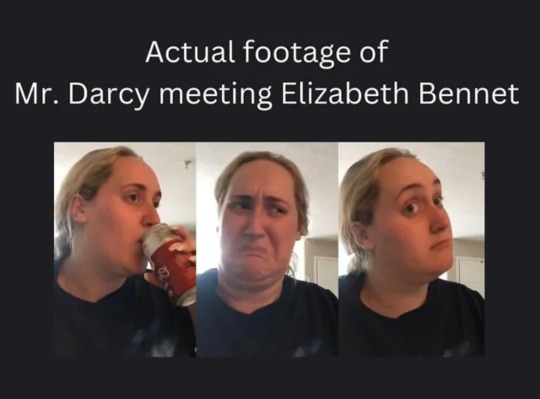
So the reader is now invited to some irony which Elizabeth is not privileged to enjoy. But it’s all in service of the comedy, right? Because it’s more delicious for the reader to see the contrast of how much Elizabeth is wrong about what he thinks of her.
You, the reader, have a good chuckle with the author about this, don’t you? But while you’re laughing you’re MISSING A CLUE! And it’s right there: Elizabeth is wrong about Darcy. It’s lampshading the fact that she doesn’t really understand him at all.
3) The real deal
So then we get a little closer to Darcy. Elizabeth stays with him and his friends at Netherfield to nurse her sister. As Darcy continues to admire her, and as she continues to be oblivious, one evening he approaches her and this happens:
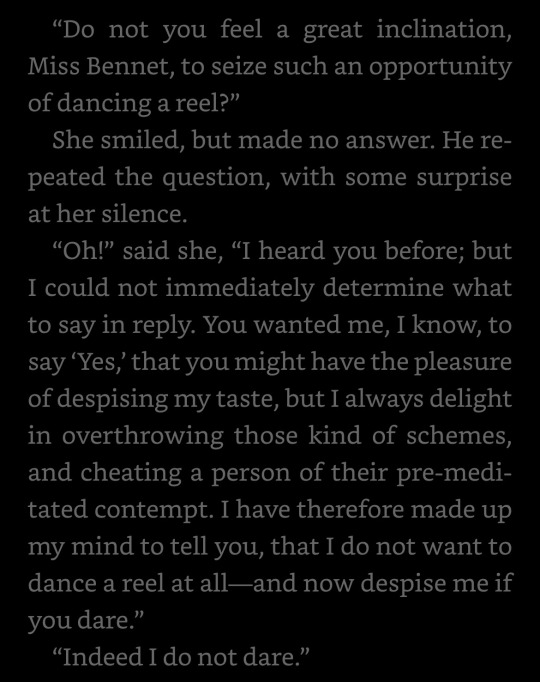
Again Elizabeth is wrong about Darcy, but here Austen adds another clue:

So… the guy who has the superpower of turning any normal situation awkward makes this super awkward situation… charming?
And then Austen adds some misdirection by immediately adding:
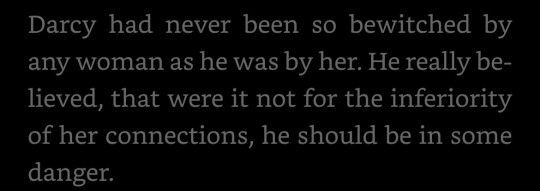
And we’re focusing on the irony that this guy is more enchanted with her the more she rejects him. And we’re a little amazed at how arrogant this guy is that he doesn’t see how much he is disliked at this moment. Almost as self-important and oblivious as Mr Collins.
And so we don’t see that… he’s nice? And I mean, an arrogant, self-important arse, as Elizabeth thinks of him, wouldn’t be nice at this point. He’d be wounded. He’d make it awkward. Importantly, he’d make it awkward for her.
It’s hard to get out of a situation like this gracefully. But he can. He knows how. He has that ability.
And this works as a bit of foreshadowing too, of course. Dancing and courtship are pretty strongly linked in Austen (and culturally in that era) and so his acceptance of her rejection in this manner lampshades his character as a lover.
But there’s so much more. That time at Netherfield is so rich in character studies, I feel like someone could write several PhD theses on that section of the book alone.
My favourite is the one that happens when Darcy and Elizabeth literally talk about characters. Miss Bingley asserts that Darcy is perfect, has no flaws. Elizabeth is delighted: this is just what she thinks Darcy thinks of himself.
Darcy says: No, I’m plenty flawed, thanks.
Elizabeth is curious now. Go on, oh prideful one, enlighten us mere mortals!
Darcy explains that he’s resentful, that he doesn’t forget or forgive easily.
Elizabeth has to admit that that’s a non-ridiculous answer. She’s disappointed, a little, because what good is that to her, since she wanted to have a good laugh at this expense? But he predicted as much and at the beginning of this conversation challenged her on this to preempt her making a joke of the whole conversation.
He wants to continue to be serious and this happens:
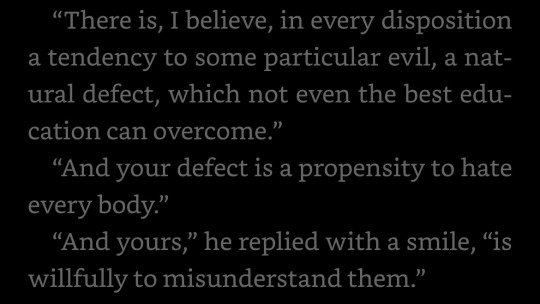
Again, Austen’s sleight of hand: when we first read this, it sounds more like Darcy is just a misanthrope who has a negative and pessimistic attitude towards people. That’s how Elizabeth hears it too.
But he tells us himself: that’s not what he means. Elizabeth (and the reader) is misunderstanding him. And he shows us, right away, by taking her jibe in good humour right then and there.
Multiple times, Elizabeth teases or attacks him, and he’s cheerful about it. He thinks it’s kind of funny. Bingley gets a shot or two in, and Darcy takes that on the chest too.
Austen manages to create this impression of him in the reader’s mind of a guy who is angry and prideful all the time, but when we review his actions, how often is this really true?
4) Darcy through the eyes of others
In many analyses, Elizabeth is blamed for being so easily taken in and so stubbornly mistaken in Darcy, but in all fairness, look at what she has to work with!
So much of what she learns about him is through other people, and so what she knows is filtered by their interests, skewed perspectives and compromised judgements. The fawning of Caroline Bingley and Mr Collins, the hatred of George Wickham, the deference of Mr Bingley, the lack of deference from Colonel Fitzwilliam, the way Charlotte views men, the way Jane always finds good things to say about anybody, her mother’s vulgar prejudice, all of it adds to a picture of absolute confusion. And the worst offender is Darcy himself, of course, because he stubbornly refuses to clarify anything about himself, partly because he can’t and partly because he just won’t.
Darcy’s stay in Hertfordshire culminates in this exchange, at the Netherfield Ball, between Darcy and Elizabeth:
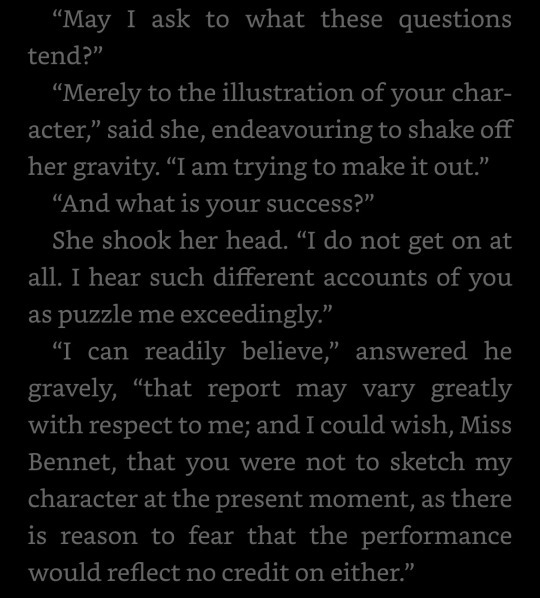
5) Mr Darcy in love
Darcy really is a hard nut to crack, and in large part it’s because he makes himself hard to crack. The baseline here is pretty bad but it gets so much worse the more he loves Elizabeth and the more he is determined to hide from her.
Before, he just doesn’t care what people think of him. But now, he does care and he desperately wants them not to know that he has, annoyingly and embarrassingly, fallen head over heels in love.
Austen strings us along in this confusion until the absolute shock that comes with his proposal. Even though we as readers always knew more than Elizabeth did, and even though both we the readers and Elizabeth had tonnes of evidence and clues about Darcy and his real character, this twist comes as a complete surprise.
And because we, the readers, and Elizabeth, the protagonist, are surprised, we don’t notice another important clue. Darcy is also shocked. Like, we’re all sitting in this scene, aghast, amazed, shocked. We all came to this point following a trail of wrong clues, misdirections, misunderstandings and mistaken assumptions.
But what does this tell us about Darcy? Other than what he finally reveals through his letter, we learn that the entire time he thought Elizabeth:
Knew what she was doing, flirting with and encouraging him
Understood his prevarication
Expected a proposal
The poor man doesn’t come out of this looking good, does he? It makes him look really arrogant, self-important and big-headed. And to an extent, well, it is.
But there’s also another, kinder, reading to all this: that he’s someone who overthinks things.
There’s the conversation in Netherfield with Bingley where he deprecates those who do things rapidly as if it were a virtue. We know from other parts of the novel that he’s a bookish (he prides himself in his library), intellectual (he admires those who read), “clever” (in the narrator’s own words) guy.
Used to responsibility, used to being relied on to guide and advise people, used to solving knotty problems, Darcy approached his problem (loving a girl who is in every way beneath him) in the same way. He deserves a large portion of the smackdown he receives—no argument from me here. It does him good, later, as we all know. But when we revisit the novel, these deeper dimensions of his character become more apparent whenever we come to this moment: that Darcy’s flaws are not just the obvious ones here (pride, arrogance, lack of manners) but also shades of other traits of his.
6) A mystery to the very end
At this point, Austen begins to clear the mist a little. Darcy gets such a blow with Elizabeth’s rejection that our heart does go out to him, and then the letter explains so much, you begin to feel like he’s been wronged with our harsh view of him. We’re brought into his home, and so, slowly, we are shown that, yes, he’s sort of quiet and taciturn, and maybe his people skills aren’t exactly up there, but he’s actually quite nice, at least willing to try to be outwardly more friendly, but in essence he’s a kind person and a responsible landowner. Elizabeth begins to see that he’s rather attractive.
The reader and Elizabeth begin to thaw towards him. And then Lydia runs away, All seems lost. Wickham has been such a wicked force in Darcy’s life, Elizabeth has already tried Darcy to the edge of what any reasonable man would put up with and Elizabeth’s family exposes herself in the worst possible way.
What I love is that Darcy’s true character is always, always most visible through his actions. This mirrors the whole point of the novel of course: that we should pay attention not to impressions, superficialities (words) but to what people really are, and what they actually do (actions). So, Darcy doesn’t say anything, in fact he swears everybody to silence. He just does. He saves Elizabeth’s family in the most warm-hearted, generous and forgiving way possible.
Anyway, I could write books on this subject just because of how much there is to say, and this is but the tip of the iceberg, but I’ll leave off here. I just wanted to explain why I love Mr Darcy, the character, and why you should too. Not as a literary romantic hero, not as a literary crush but as a really interesting, beautifully written, complex character in his own right.
117 notes
·
View notes